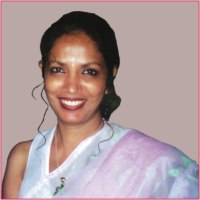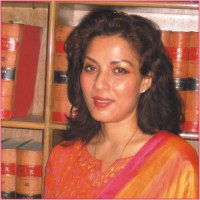|
|
 Dr.
Rifat Rashid Dr.
Rifat Rashid
Director, France Bangladesh Chamber of Commerce & Industry
“If a woman is economically
successful and makes a contribution to the welfare of the family,
she automatically commands respect from her husband, -in-laws
and the society," is what Dr. Rifat Rashid, Director, France
Bangladesh Chamber of Commerce and Industry, feels.
If you dwell on this thought
for a moment, you would certainly be able to empathise with
her comment. Whether it's a woman from the village with no education,
the house help in your home, or you in the higher social strata
of life, if you have a way of earning and ability to share the
issues involved in running your family, then you have a scope
of being considered as a partner. He would be reliant upon your
support. The financial dependence is what that has made women
subject to discrimination and the objects of much ill treatment
throughout the ages.
"Equality doesn't mean
donning a trouser, smoking and being able to rest a hand on
the shoulder of a friend while greeting them. Why do I need
to do all these to press home a point? I like being a woman,
I am proud to be a woman and frankly I don't want to be anyone
else other than a woman."
In reply to a question Dr. Rashid
commented that what the woman activists are doing for our hard-up
lots have good intent but its results are yet to be seen. A
woman needs to be aware that she requires education and or skill
in order to be able to contribute to the welfare of her family,
to have something that she can call her own, only then she can
change her social position," Dr. Rashid says.
With that acquisition she is
likely to gain a situation independent from being only a wife
and a mother in the household.
Being the only woman director
of a chamber body in our country, equipped with a PhD from Sorbonne,
the extremely confident Rashid says that her sex has never posed
a problem for her, on the contrary, it has always put her on
ease with the almost ninety nine and half percent male dominated
job that she does.
"If there was a matter
of discord with anyone in the profession it was solely for personal
reasons rather than being an issue of my gender. Men's day or
Women's day I don't give too much importance to this idea,"
she explains adding further that empowerment is within you but
identification of requisites and the necessary environment are
essential.
"When I am in home I've
another role as a woman and I don't like to think of it as a
discrimination; no matter what you say we are not the same.
There's a biological difference and at the end of the day you
have to bear the child, you are the mother and your affection
and care are needed to rear your children. Women are proven
to be adept to this job than male. However, recently fathers
are doing the mother's job and this experiment seems to be working
as well." Imposed social conditions where a mother is the
only one rearing and bearing the children is now more a matter
of choice than a gender issue.
In family life both the man
and the woman need to be confident and understanding of each
other. If you are insecure when your husband has to stay out
late for work or if your husband questions the late night phone
call from work, or your lunch out with male colleagues is not
so much a gender issue as a personal one. It's a problem with
the insecurity in the relationship rather than your husband
trying to dominate you because you are his woman.
By Raffat Binte Rashid
|
|
 Barrister
Tania Amir Barrister
Tania Amir
Practices law at the Supreme Court
How
does a successful career woman such as yourself, handle both
the world, family and career?
nce I heard a wise lady say that 'the graveyard is full of indispensable
people'. In other words no one is indispensable. The higher
you climb the more you need to delegate. In order to be successful
in life a person cannot be at all place at all times. There
is more than one style of management. Some people might take
control of everything and do it themselves but I want to distribute
responsibility to other people even to my children. I believe
in delegation rather than keeping control to myself. When I
do household job I do it from my heart. I am not desperately
trying to please anyone.
Do
you think family can be a barrier in pursuing successful career?
Family can be a barrier sometimes but it can also be a great
support. Success is inevitable if you try hard with sincerity
and have the right attitude.
You
must have a hectic schedule. Do you get enough support from
your husband?
Of course I do, I make sure of it.
Do
you think celebrating a special day yearly and all the big talks
in any way effect women's social status when for rest of the
year they play the stereotyped role?
Well, it might not work instantly to solve a specific problem
faced by an individual at the micro level, but at the macro
level this occasion is an opportunity for policy makers to focus
on issues on this day, make assessments, future decision, allocate
budget for future work and set goals and in the long run, it
ultimately plays a significant role in resolving problems in
the micro level.
I
am not sure with the term 'celebrating'. I think we observe
a day such as International Women's Day as we do Ekushey February.
However, this day seems to be losing its significance because
different companies are using the International Women's Day
to sell their brand names to women, using it as a marketing
tool i.e. selling cosmetics, cooking spices, etc by marking
the term 'Nari Dibosh', which dilutes the real aspiration of
this occasion. We are all in favour of awareness building, but
not in the negative sense.
What
is the current status of women working in the legal profession?
Increasingly more women are choosing the profession. Although
the number is growing but I do not think that it is yet satisfactory.
Women in the law are increasingly playing an important role
in human rights issues, criminal and family laws but there are
not enough expert in company laws, international law, or constitutional
law. In fact it is not just women, in general, we have very
few lawyers in Bangladesh who are competent enough to handle
these commercial or constitutional matters.
Do
you consider yourself truly empowered?
I believe in self-development and self-growth. It is a constant
process, everyday there are new challenges that everyone faces
and I look upon them as an opportunity of growth and empowerment.
In the process I try to reassess, redefine and recreate myself
everyday, in a manner, which is more empowering to me.
By Shahnaz Parveen
|
 Rubana
Huq Rubana
Huq
MD, Mohammadi Group
Rubana Huq, the Managing Director
of Mohammadi Group one of the leading garment factories in Bangladesh,
feels that every day is a gift of God and since she works daily
with women in her trade, every single day calls for a celebration
of professionalism.
"When I come to work or
when I am at home, every day is my day. Women in any case are
all overachievers so it's not a matter of just equal rights
but a matter of precedence. I don't want parity I want precedence."
Huq feels that womanhood has
achieved a certain level of maturity and there is more to go.
In her trade over the years, women have become vocal and resilient
and anyone who is economically emancipated would not, in her
sane mind, take any abuse.
It's again a question of emancipating
economically that becomes the issue here and Huq justifiably
points out "It's a pretty sight early in the morning to
see these women going to work, to see them giving money to their
husbands during lunch break, to see them hire help to baby sit
while they are at work. It's much prettier to see this massive
change which is so very clear and visual. I deal with women
from the disadvantaged social strata, those who are not educated
and have been discriminated against even before their birth,
so I believe I see the changes in its true colours."
During the last ten to twelve
years time span women who are earning their own bread and support
their family but does not take abuse or allow their pay cheque
to be spent by their husbands or fathers only, they shape their
own future; they are much more vocal and aware of the rights.
"In my trade, workers are
required to be organized because it's line management, they
need to be steady, committed and responsible and all these attributions
are synonymous with women, so encourage more women to join.
However for this positive change to keep going, factories must
have maternity rights, welfare rights, health care facilities
and benefits, because in a quota free world buyers can buy from
anywhere in the world. In order to compete globally we must
have these HR compliance issues dealt with," Huq say enthusiastically,
emphasising that these women are also shaping our future.
"Its still a man's world
but I vehemently object to that and also 'doing a man's job'.
I do a job irrespective of my gender and for this I become a
better person every day," she says pointing out that having
achieved emancipation or whatever it is that you need to accomplish,
you should always remember to strike a balance between home
and work. "
There is one handicap: you need
to put ten to twelve hours of work everyday and the children
might miss you quite often, and no matter how supportive the
husbands are, all of us are shades
of grey, no one is black or white," Huq explains.
By Raffat Binte Rashid
|
|
 Fatema
Begum Fatema
Begum
Additional Deputy Inspector General of Police
Serving as the Special Branch Training School Commandant
“I never accepted the social
obligation that men and women would go for different profession.
I followed my aspiration and chose this profession", says
Fatema Begum, the Additional DIG of Bangladesh Police. Fatema
Begum joined the force back in the year 1986 as an Assistance
Super of Police and is now serving as the highest ranked female
officer in the police force.
In the light of International
Women's Day it only seemed relevant to ask her about the general
position of female personnel in the police department. "Most
of the time female police officers are assigned to desk jobs
or given less important responsibilities, thinking that they
might not be able to handle serious pressure. I think this is
a form of discrimination", she answers.
She gave us some insights on
why this scenario prevails in the police department. "Women
still receive certain amounts of pressure from their male counterparts
as, with ours being a patriarchal society, men are not yet used
to taking orders from women. Adding to this, female personnel
themselves prefer desk jobs. Family responsibility is a huge
barrier that makes our female workforce restrain from taking
over important assignments". However, she believes "It
all depends on the person. This barrier can only be leaped over
if female police officers wish to take control of their lives".
She has taken over a man's job
in a man's world. How did she survive all the pressure, we asked.
She recalls, "Back in the 80s when I joined the force,
society did not approve of women in the police force. At that
time there was no woman serving in my rank, only a few in the
non-ranking posts. The department was not ready and there was
confusion about allowing a woman to take such responsibility.
Through my work I have proved myself and now I am respected
by my colleagues".
We also asked her how she thinks
about a special day being observed for women or is it really
helping our womenfolk? She says, "Women are marginalized
in our society. They are considered sub-ordinate". She
believes "They should receive a special boost to reclaim
their self-esteem, which they lost over the years. It will eventually
help them in becoming equal beings".
"Seminars and special discussions
about women rights held on this day help at least some people
to have better understanding and realisation." She adds,
"There is no day for men because they are already privileged
in every aspect of life".
Is she truly empowered in her
life, we also asked, "I am lucky in my personal life, having
better understanding with my husband. I received support from
my family as well". However this is not the case in every
woman's life she pointed out.
She also pointed out that, things
are gradually changing. People are getting accustomed to the
sight of women in uniform. And she conveyed that "For better
appraisal it is women themselves who must prove all the social
taboo wrong. Women have to leap over the barriers they face".
By Shahnaz Parveen
|
a
moment
for our men…
While
working on these interviews my reporters and I have come to
this understanding that the saying 'Behind every successful
man is a woman' can safely be reversed and told the other way
around.
On
this International Woman's Day I personally take a moment to
actually give credit to these men behind these and every other
successful woman, for being supportive and actually respecting
them the way they are. And I don't think that I have made a
sacrilegious comment.
In
fact I want our men to come out of their narrow egoistic world
and broaden their horizons the way a few of their gender have
done, and recognise the fact that women are no different than
men. That the difference is only a matter of biology and not
psychology or any other logy that they prefer to think.
Imagine
a world full of men only or only women for that matter. How
pathetically dull and boring it would be, don't you think? Together
both of us paint the world in such loving colours. What's wrong
in accepting this fact?
I
want our men to realise that their petty, archaic thoughts regarding
women being the lesser mortals should change once and for all.
Its high time they show some maturity and get out of this constipated
thought process.
Just
consider these women this week's issue of Star Lifestyle highlighted.
They are all achievers, in fact, over achievers. They are all
successful both at work and at home and at par with their husbands
and living in perfect harmony with them. And the credit goes
to the men in their lives, their husbands and fathers, who were
smart and modern enough to break free from their narrow-minded
ignorant dark world. They gave their wives and daughters equal
treatment. The affirmative action that's been the cause for
a while now and for which women's lib has and is going strong,
also began with the support of such men.
If
only men like the fathers and husbands of say any Rahima, Sakina,
Zarina's, be they middle class businessmen, bankers or rickshaw
pullers or even teachers, professors or members of the upper
class elite, would agree with me and give their wives or daughters
a fair chance, the world would be definitely a better place.
However
the Rahima's and Zarina's should also know that where there's
a will there's way, they should be assertive of their rights
and able to put their foot down when they are being dominated
or suppressed. Its the 21st century and women should not be
just happy to be able to live only.
Never
forget that we, the women, are sensible, committed, responsible,
hard working and with education and opportunity there's no stopping
us. Instead of being afraid of our capability, the men in our
lives should appreciate it, then we can also be supportive of
you and take you places with us.
By Raffat Binte Rashid
|
|
 Mobasshira
Farzana Mithila, Mobasshira
Farzana Mithila,
ATN Bangla newscaster and Junior Lecturer,
Independent University, Bangladesh
On
women in the broadcasting media business:
Women are highly regarded in this field. In fact, in the three
private channels that we currently have, women far outnumber
the men asw news presenters. However, one has to realize that
part of the reason why this is so, is because newscasting and
TV anchorage and related jobs are high-profile jobs where presentation
is the keyword, and as such, women are preferred because they
are still considered a highly 'marketable' asset.
It
is unfortunate that in our country, news presentation is seen
as being separate from broadcasting journalism as a whole. You
don't see as many women being hardcore reporters or holding
many posts not related to presentation. Our social structure
still isn't prepared to facilitate women exploring the different
aspects of this business. Even so, I feel that we have made
a lot of progress in this field, and I'm optimistic about where
we'll be in the near future."
On
women and journalism as a whole:
"This is a fascinating field to work in, with immense prospects
for the future. We Bangladeshis have barely begun to explore
the possibilities that the world of Media and Communications
has to offer. Especially in the case of women.
I
personally feel that we've really come a long way. A few years
back it was unimaginable for a woman of any age to do fieldwork;
to do things like crime reporting, for example. Yet there are
women who have done this and proven that it is possible. Even
though we are few in number, I believe women as journalists
are slowly becoming more acceptable, and even respected.
The
main obstacles are provided by the families. Parents don't want
to allow their daughters to take on what they perceive are terrible
risks; this concern is intensified when the female journalist
has a family of her own to care for. Yes, there are risks, but
I personally believe this is because we are living in troubled
times, and the risk factor applies for all journalists, be they
men or women.
Overall,
I am pretty optimistic about the way things are progressing,
and I'd encourage any young woman who wants to enter this profession.
It's got so much promise!"
On
women as educationists:
"Now here's a profession for women that has a lot of popular
support...at least in terms of acceptability. Women having been
seen as the nurturing caregivers, the role of teachers and professors
seems to fit the bill. And we do our work with panache too.
This is one arena where you are seen as a professional before
you are seen as a man or a woman.
However,
it's pretty hard on women who have families to juggle with their
work. This line requires a lot of concentration, a lot of research,
and especially when you want to teach at the University level,
you need to obtain the degrees first. It's far easier for a
man to drop his family and go abroad for three or four years
to obtain a fellowship than it is for a woman. But you do see
plenty of women who are managing it, and kudos to them for meeting
the challenge.
By Sabrina F Ahmad
|
|

